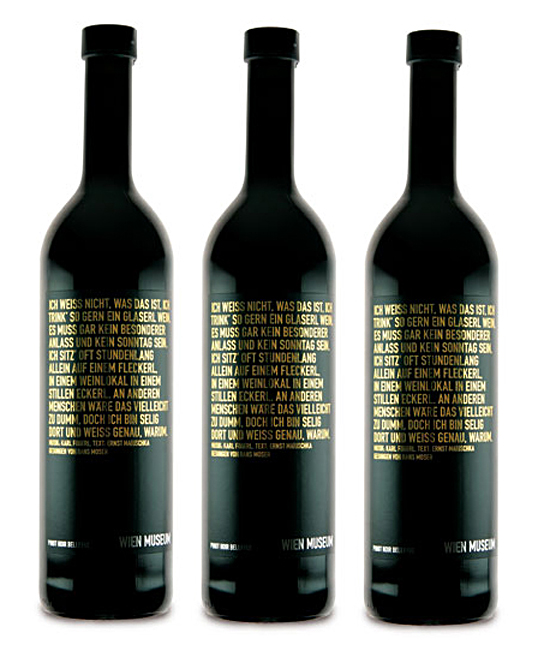 The seven square kilometres of vineyards that lie within its boundaries make Vienna the world’s largest wine-growing capital city. The most extensive area is on the northern fringe in districts 16-19, but the highest quality vines lie over the Danube in the 21st district. On balmy summer evenings, join the Viennese for an evening in a Heuriger, one of the scores of rustic wine
The seven square kilometres of vineyards that lie within its boundaries make Vienna the world’s largest wine-growing capital city. The most extensive area is on the northern fringe in districts 16-19, but the highest quality vines lie over the Danube in the 21st district. On balmy summer evenings, join the Viennese for an evening in a Heuriger, one of the scores of rustic wine  taverns dotted among the vineyards that skirt the Vienna Woods. The website www.heurigenkalender.at is a useful resource in English that provides up-to-date hours for venues in Vienna and beyond. The further you go, the higher the chances of finding the authenticity and breath-taking views that make a real Heuriger so memorable. The following are particularly recommended: Heuriger Göbel (21, Stammersdorfer Kellergasse 131, 294 8420/0664 2439835), Hirt (19, Eisernenhandgasse 165, 318 9641), Sirbu (19, Kahlenberger Strasse 210, 320 5928) and Zawodsky (19, Reinischgasse 3, 320 7978).Vienna is a city of bureaucrats and students, all of whom have to be fed and watered. Inside the city’s hulking ministries and cultural institutions, canteens are open from Monday to Friday – and access to these subsidised salons is generally unrestricted. If you’re on a budget or merely fancy a peek into the underbelly of the Austrian state, here are some central options.
taverns dotted among the vineyards that skirt the Vienna Woods. The website www.heurigenkalender.at is a useful resource in English that provides up-to-date hours for venues in Vienna and beyond. The further you go, the higher the chances of finding the authenticity and breath-taking views that make a real Heuriger so memorable. The following are particularly recommended: Heuriger Göbel (21, Stammersdorfer Kellergasse 131, 294 8420/0664 2439835), Hirt (19, Eisernenhandgasse 165, 318 9641), Sirbu (19, Kahlenberger Strasse 210, 320 5928) and Zawodsky (19, Reinischgasse 3, 320 7978).Vienna is a city of bureaucrats and students, all of whom have to be fed and watered. Inside the city’s hulking ministries and cultural institutions, canteens are open from Monday to Friday – and access to these subsidised salons is generally unrestricted. If you’re on a budget or merely fancy a peek into the underbelly of the Austrian state, here are some central options.Near Schottentor U-Bahn you can ride a hop-on-hop-off paternoster lift to the top floor of the NIG (1, Universitätsstrasse 7, 406 4594) to a penthouse MENSA with striking views of the Rathaus, Votivkirche and Josefstadt prison. The food is fairly pedestrian, though. In the Innere Stadt, the Musikakademie MENSA (1, Johannesgasse 8, 512 9470) combines historic surroundings, decent main courses and piano practice. Nearby on the Ringstrasse, another MENSA at the Akademie für Angewandte Kunst (Oscar Kokoschka Platz, 2) is a dirt-cheap pre-fab full of hipster art students. Another art school canteen, with a magnificent interior and large beers at €2.20, is the Akademie der Bildenden Künste (1, Schillerplatz 3, 588 16-1166). For basic Austrian dishes, the canteen of the state-run Akademietheater (51444-4740) is pretty faultless. Enjoy a cheap Schnitzel and sautéd potatoes on period Formica tables in the company of stagehands, actors and academics. Superior nosh is on offer at the Minoritenstüberl, the Education Ministry canteen (1, Minoritenplatz 5, 533 5281) where every Wednesday they serve Beuschel, Vienna’s classic offal dish.Würstelstand (sausage stands) are a ubiquitous sight on Vienna’s streets, dispensing piping-hot sausages and hot dogs. Among the best stands are the Würstelstand am Hohen Markt and the impressively sleek Bitzinger outpost on Albertinaplatz. One delicacy perhaps best left to locals is the Käsekrainer – oozing with cheese, and fondly referred to as
an Eitriger, or pus-stick.With over 1000 kilometres (620 miles) of bike paths in the city and around, Vienna is superb for cyclists. Popular locales for a bike ride include the Prater, along the Donaukanal and around the Alte and Neue Donau, and on the Donauinsel; you can also circle the Ring on a bike path. For out of town cycling, head west along the Danube, or go mountainbiking in the Vienna Woods.Citybike is a public rental scheme. Register online (€1 registration fee) or at one of the 61 docking stations, using a credit card; alternatively, buy a Citybike Tourist Card (€2) at Pedal Power (2, Ausstellungsstrasse 3, 729 7234) or Royal Tours (1, Herrengasse 1-3). If you return the bike to another docking station within an hour, the ride is free; after that, a small charge applies.As well as offering baskets of organic produce from local sources, deli and record store Tongues operates a waste-not, want-not policy that sees unsold organic veg and produce cooked up into wholesome lunches, sold at remarkably low prices. Soup is €2.20, mains a mere €2.80; not surprisingly, they’re often sold out later in the afternoon.
No comments:
Post a Comment